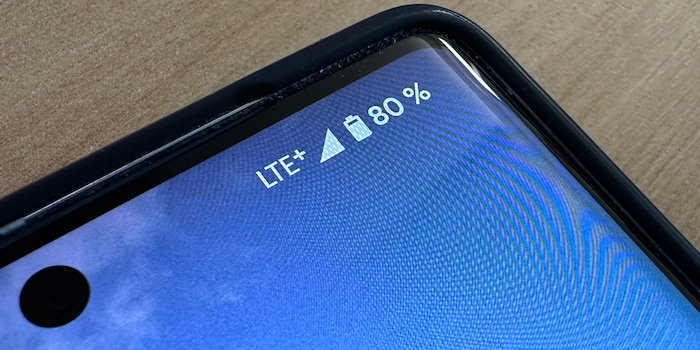
Background information
«We’ve deliberately taken a new, out-of-the-box approach»
by Martin Jungfer

Switzerland has one of the best mobile networks in the world. Nevertheless, sometimes nothing works. I discussed the reasons for this with mobile communications expert Jean-Claude Frick.
It’s death, taxes and this. Whenever our digitec connect team presents a promotion, comments on the quality of the network abound. Under the post, we receive countless descriptions of where there’s reception – and especially where there isn’t. Jean-Claude Frick, telecom expert at comparison service Comparis, is familiar with these anecdotes. He deals professionally with network quality. In doing so, he’s often on the move and online and has agreed to shed some light on the subject.
Hello, Jean-Claude, glad to reach you. Are you on the move?
Jean-Claude Frick: Not right now, for once. I’m in my home office using my Wi-Fi. FaceTime should therefore run smoothly for our conversation.
So you’d rather not have this conversation on the road?
It would probably work out. Especially when I’m in one place, for example, and with fewer people around.
**That’s quite a few restrictions… **
Admittedly, this sounds worse than it is. Switzerland has one of the best mobile networks in the world. But here, too, there are times when it reaches its limits.
Let’s stay with «one of the best mobile networks» in the world for a moment. How is this determined?
For Germany, Austria, and Switzerland, annual network quality tests by Connect (site in German) are the gold standard. No one measures as precisely and meticulously. If you look at the detailed results, Swisscom, the top dog in Switzerland, manages 970 out of 1,000 possible points. In Germany, Telekom came out on top with 952 points.
Which network operators came in second and third?
Here it becomes clear that Switzerland has two providers, Sunrise and Salt, which are almost on a par with Swisscom. With 959 points, Sunrise is technically better than Germany’s winner Telekom, for example. And Sunrise would be on a par with number one Magenta in Austria.
So is Switzerland really an extreme case of first-world problems?
You can say that, yes. I travel through Germany from time to time, and the «E» for Edge network appears on my display often enough. This is definitely a rarity in Switzerland by now. Here, we have at least 4G available almost everywhere. Especially with Sunrise and Swisscom, there are hardly any grey areas left on network coverage maps, i.e. areas without network availability.
Where do dropouts and seemingly eternal loading times come from?
The problem here isn’t so much coverage, which is what the Connect test primarily focuses on. If someone is surfing on their smartphone and a page takes forever to load or a Netflix stream falters, it’s often due to network congestion. Meaning there are simply too many people in a cell and its capacity is no longer sufficient for everyone.
Could you give us a concrete example?**
Typically, such congestion occurs during major events. Whenever a large group of people in one place uses the network at the same time. But also when taking the train. I commute regularly between Bern and Zurich. In doing so, me and some 1,000 other people drive into the same mobile cell. One person watches a movie, the other swipes through TikTok – all in all, that’s a huge amount of data. At some point, the capacity is no longer sufficient for everyone. Especially for those sitting further back in the train.
Too many people on too little network, then?
Network operators naturally want to utilise their networks to the optimal capacity. In recent years, Sunrise and Swisscom in particular have let resellers (editor’s note: like digitec connect) into their networks. In some cases, they’ve even created their own low-cost brands, such as Sunrise with Yallo and Swisscom with Wingo. This means that anyone travelling with a Wingo subscription is in principle still a Swisscom customer and uses the Swisscom network. This is where shifts to more favourable offers ultimately take place. And of course, people use the web differently than they used to. Streaming Netflix simply takes more volume than receiving a few e-mails.
Could Sunrise and Swisscom block customers with subscriptions from a reseller earlier in the event of congestion to keep the network free for their premium customers?
With their own resellers, that would be technically possible. This would allow Swisscom to de-prioritise Wingo customers when capacity reaches its limit. But why would they do that? After all, they earn money when their own resellers are successful.
You mentioned this as an option for their «own resellers». What about completely independent providers such as Quickline or digitec connect? Could they be disadvantaged?
No, that’s prohibited under competition law. In principle, you won’t be at a disadvantage if you don’t have a subscription directly with Swisscom or Sunrise, but instead use a reseller who’s usually cheaper.

Could the 5G network rollout fix our congestion problem?
Yes, we see congestion mainly in the 4G networks of Swisscom and Sunrise. Salt has fewer customers and therefore fewer problems. 5G offers higher capacity, so companies are starting to shift customers in that direction.
But some of them demand steep surcharges for it…
Expanding costs money, of course. It’s a trade-off between siphoning off the willingness to pay for those who already desperately want or need 5G today, and fixing the congestion problem. However, I firmly expect 5G options to become more affordable in the future.
You must already have a smartphone with 5G, right?
(Laughs) Of course. I do have an excuse, I need it for professional reasons.
Jean-Claude, thank you for talking with me.
Disclaimer: I worked with Jean-Claude Frick at Comparis in 2020. He’s employed as an expert in telecommunications. In addition, Jean-Claude runs a YouTube channel and hosts Apfelfunk, a German podcast about Apple.
Header image: Martin Jungfer
Journalist since 1997. Stopovers in Franconia (or the Franken region), Lake Constance, Obwalden, Nidwalden and Zurich. Father since 2014. Expert in editorial organisation and motivation. Focus on sustainability, home office tools, beautiful things for the home, creative toys and sports equipment.
Interesting facts about products, behind-the-scenes looks at manufacturers and deep-dives on interesting people.
Show all